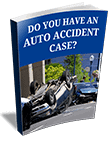What to Avoid during a Personal Injury Case
Interviewer: Are there common mistakes that people make, even unintentionally, that hurt their ability to have a case? You mentioned talking to the other party’s insurance company. What other things do people do that inadvertently hurt them?
Always Seek Medical Care and Follow the Physician’s Instructions
Stephen: Failing to properly seek medical care is a big mistake. After that, failing to properly and fully follow your initial doctor’s instructions, as in not filling medication or not following back up with the doctor. Those are big mistakes.
A lot of people try to “tough out” an ailment. The way that insurance companies interpreting you toughing it out is that you weren’t really hurt.
Some Injuries Sustained in Auto Accidents Do Not Immediately Manifest
Interviewer: Have you found the nature of auto injuries is that people feel them right away do symptoms or problems occur more gradually?
Stephen: It’s both. Sometimes people have injuries, if you have broken bones and objective injuries: lacerations, broken bones, objective injuries to that nature. Obviously, you know that right away.
What I have found in my experience, sixteen years at this point, is what tends to occur with most neck, back, shoulder, elbow, wrist, knees, hip, injuries of that nature. People don’t realize the full extent of them after an accident or even two or three, it takes two or three days for it to set in.
Partly because the body gets full of adrenaline and you’re in shock and you don’t want to be hurt. It’s such a violation into your life. Most problems people have they try to ignore, then there becomes a process, a realization process, well I have a real problem here and I can’t ignore it. I see that a lot.
Delaying to Seek Appropriate Medical Care for a Week or Longer Harms the Viability of a Personal Injury Case
Interviewer: How long is too long to wait to get medical care on average?
Stephen: If you wait longer than a week then you’ve basically assured yourself that the insurance company is going to fight your case all the way.
Interviewer: That’s a good rule of thumb to follow. Are there any other mistakes? How about at the scene of an accident?
It Is Important to Contact the Police at the Scene of an Auto Accident and Always Photograph the Scene of the Crash
Stephen: Not calling the police is a huge mistake. You should always call the police. Usually when a driver has hit you and they get out and their number one concern isn’t about you, it’s about their insurance rates going up. That’s the first thing they’re thinking about and they don’t want the police called.
You must call the police. The other huge mistakes, nowadays, is because everyone has cameras on their phone but they are not taking pictures of the vehicles and the scenes and the scene of the crash. If you don’t do that, then people will ask, “Why didn’t you?” If you have a camera phone and you didn’t do take any photos, that raises a red flag to insurance companies.
You must to call the police and you must to take photographs of the damage and witnesses and the scene of the crash.
If the Police Cite You as the Driver at Fault, Does That Harm the Viability of a Personal Injury Case?
Interviewer: What happens if the police come and they cite you as being the person at fault in an accident? Does that mean you can’t have a case?
Stephen: It often does harm a case. The only exception would be a very rare circumstance, like for example, you were cited because you were taken away in an ambulance and then the person who really caused the crash was the only person who talked to the police. That may be an exception.
At the Scene of an Accident, Always Obtain Contact Information for Any Witnesses
Juries tend to rely real heavily on what police officers have to say because they’re the independent party out there. Then you have witnesses sometimes, which leads me to a good point about people do failing to get witness contact information.
Interviewer: Is that to prevent the other party from manufacturing witnesses and saying someone was where when they weren’t?
Stephen: That won’t last long. You see that come up in rare circumstances but when people start to understand that okay, a legal process has begun, if they didn’t witness an accident, they’re not going to come and testify that they did.
Sometimes people say questionable things at the scene of the accident but as far as false testimonies and false witnesses, you rarely see that, because as the litigation plays out, very few people are going to take that type of legal risk.

